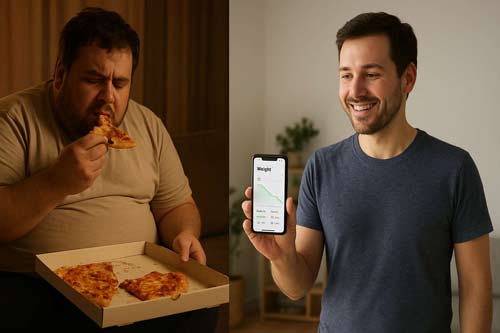Weight Loss App: New Interventions
Overview
Many individuals with obesity struggle to sustain weight loss after completing a diet-based intervention. A significant reason for this is that traditional weight loss methods often fail to address the natural regulation of hunger and fullness, leading to a return to previous eating behaviors over time. This study evaluated the long-term effectiveness of a psychological weight loss program delivered via smartphone, which focuses on retraining the perception of satiety without providing any dietary guidelines. The study, involving 75 participants with obesity, assessed changes in body weight and psychological factors like satiety, food cravings, and emotional eating. Measurements were taken at baseline, during the program, and at 6- and 12-month follow-ups. The results demonstrated consistent weight loss throughout the study (p = .029) and improved body composition at the 6-month mark (p = .018). These changes were linked to enhanced satiety awareness, reduced cravings, and decreased emotional eating. Importantly, all improvements were maintained at the 12-month follow-up (p < .005). This suggests that a psychological approach focused on satiety awareness may be more effective for long-term weight management compared to traditional diet-based strategies.

Introduction
Despite the range of weight loss programs available, their long-term success is generally limited (Canuto et al., 2021; Jauch-Chara & Oltmanns, 2014; Kheniser et al., 2021). Many individuals regain the lost weight after completing the program (Amigo & Fernandez, 2007; Ge et al., 2020; Korkeila et al., 1999), with only about 20% of overweight individuals able to maintain a weight loss of at least 10% for one year (Kraschnewski et al., 2010; Wing & Phelan, 2005). One primary factor contributing to this long-term failure is the disregard for physiological cues related to hunger and satiety. Conventional diet plans typically focus on specific food choices, calorie restrictions, and set eating times, often ignoring the body’s natural mechanisms of hunger, satiety, and taste preferences. This can lead to the resumption of old eating habits and, consequently, weight regain. Additionally, restrictive eating can foster overeating and disrupt normal food intake control (Birch et al., 2003; Wardle & Beales, 1988).
From an early age, overweight and obese children often show higher tendencies to eat without being hungry (Kral et al., 2012; Lansigan et al., 2015), which is linked to parental restrictive feeding practices (Fisher & Birch, 2002). A study revealed that after a 24-week weight loss program, obese children showed impaired brain-based satiety responses, potentially setting them up for future weight regain (Roth et al., 2022). This highlights the relevance of intuitive eating, a practice that emphasizes eating in response to natural hunger and fullness signals (Tribole & Resch, 1996; Tylka, 2006). Research consistently shows an inverse relationship between intuitive eating and body weight (Denny et al., 2013; Gray et al., 2012; Herbert et al., 2013; Owens et al., 2023).
In a randomized study, Bacon et al. (2005) demonstrated that intuitive eating helps chronic dieters maintain weight over a 2-year period, along with improving their recognition of hunger and satiety cues. In contrast, participants in a traditional diet group initially lost weight but eventually regained it (Bacon et al., 2005). Emotional eating, or eating to manage emotions rather than hunger (Bennett & Latner, 2022; Mai-Lippold et al., 2024; Robinson et al., 2021), is another psychological factor contributing to overeating. Individuals may turn to food in response to stress, boredom, or frustration, rather than due to hunger. Psychological interventions, such as a mindfulness-based approach combined with prolonged chewing, have been shown to support weight loss maintenance and improve satiety awareness while reducing food cravings and emotional eating (Schnepper et al., 2019).
Overall, addressing psychological factors like emotional eating and the lack of eating rituals is critical, as these are often linked to higher body mass index (BMI) (Bénard et al., 2018; Wansink & van Kleef, 2014) and are typically overlooked by conventional diets. Research indicates that as BMI increases, individuals become less in tune with their hunger and satiety cues (Denny et al., 2013). Restrictive dieting, which can trigger emotional eating (van Strien, 2018), is directly associated with weight regain, often due to lapses in dietary control (Herman & Mack, 1975).
In light of these findings, a year-long study evaluated the effectiveness of a behavioral therapy-based smartphone app designed for weight loss. The program, which avoids strict diet and exercise guidelines, instead focuses on retraining hunger and satiety perception, as well as emotional regulation independent of food. Key outcomes measured included body weight, BMI, body composition, satiety perception, emotional eating, and food cravings.
Method
This prospective interventional study focused on a group of obese participants (BMI > 30 kg/m²) who were at least 18 years old and had access to a smartphone for using a specialized app. Participants were recruited through various channels such as advertisements, mailing lists, and posters. Exclusion criteria included internal, neurological, or psychiatric disorders that could interfere with diet changes, internet dependency, and the use of weight-influencing medications. Informed consent was obtained from each participant, and they received compensation for each day of participation, regardless of weight loss or study discontinuation. The study adhered to the Declaration of Helsinki and was approved by the ethics committee of the University of Luebeck.
The study, lasting one year, involved five examinations, including baseline, one month, three months, six months, and twelve months post-intervention. A total of 75 Caucasian German adults (41 females) participated, with an average age of 50 years, weight of 106.84 kg, and BMI of 35.44 kg/m². Participants were divided into three obesity classes based on the World Health Organization (WHO) criteria: 53% in class I, 32% in class II, and 15% in class III. Although 33 participants completed the full year, the drop-out rate gradually increased, particularly at the final follow-up.
The weight loss program implemented was a three-month behavioral intervention designed to alter participants’ eating behaviors without focusing on diet, calorie counting, or exercise. The program aimed to retrain the participants’ physiological responses to hunger and satiety, encouraging long-term reductions in meal size and snacking frequency. It consisted of three modules: Rule (weekly behavioral instructions), Emotion (tools for emotional eating management), and Daily (daily notifications and support). Additionally, the program used gamification to help participants cope with food cravings.
Participants’ body weight and composition were measured using digital scales and bioelectrical impedance analysis. Rule compliance, hunger and satiety perception, and emotional eating behaviors were tracked through questionnaires. Data were analyzed using various statistical methods, including analysis of variance (ANOVA) and regression analysis, to assess relationships between behavioral compliance and weight loss over time. The study found no significant baseline differences between those who completed the study and those who dropped out, and a moderate weight loss of 5 kg was assumed for the power calculation.
Result
The study provides detailed insights into various metrics, including body weight, BMI, rule compliance, satiety perception, food cravings, and emotional eating across multiple time points.
Throughout the study, there was a notable increase in rule compliance (F[3, 86.04] = 25.23, p < .001), which continued even after the app usage ended, with participants maintaining adherence. This compliance was negatively correlated with body weight (r[306] = .154, p = .008), indicating that those who followed the app’s rules were more likely to experience successful weight loss. There were no significant differences in rule compliance between individuals of varying obesity grades (p = .518).
Participants reported a significant improvement in satiety perception over the study period (F[2.95, 76.78] = 6.14, p = .001), with consistent increases at 3, 6, and 12 months compared to baseline. Additionally, a positive correlation was found between body weight changes and satiety perception (r[297] = .165, p = .004).
Food cravings significantly decreased over the study period (F[2.82, 75.99] = 5.90, p = .001), with reductions noted at 1, 3, 6, and 12 months. Similarly, emotional eating declined significantly during the study (F[4, 100] = 4.37, p = .003). Further analysis showed a significant relationship between rule compliance and improvements in satiety perception (r[292] = .468, p < .001), food cravings (r[293] = .292, p < .001), and emotional eating (r[290] = .224, p < .001).
Participants experienced a reduction in body weight ranging from 0.1 to 8 kg after 3 months of app use, with an average weight loss of 5.28 kg after 12 months. A significant time effect on body weight was observed across the entire study (F[1.76, 54.49] = 3.98, p = .029), with continued reductions at 1, 3, 6, and 12 months. BMI also significantly decreased over time (F[1.81, 56.17] = 3.67, p = .036). The study revealed that higher rule compliance was linked to more significant weight loss, with “responders” showing a consistent increase in compliance, while “nonresponders” had lower compliance scores.

In terms of body composition, fat mass significantly declined from baseline to 6 months (p = .002), while muscle mass showed a strong trend of increase (p = .052). The fat-to-muscle ratio improved significantly after 6 months (p = .018), reflecting the program’s positive impact on body composition.
Overall, adherence to the app’s guidelines significantly influenced weight loss, BMI reduction, and improvements in body composition and behavioral metrics like satiety, food cravings, and emotional eating.
Conclusion
The study highlights that a non-dietary psychological weight loss program, delivered via an app, leads to significant and sustained reductions in body weight, BMI, and improved body composition. Unlike traditional diet-based interventions, which often result in weight regain after completion, the app-based psychological approach continued to produce weight loss for at least nine months post-intervention.
A key element of the program’s success lies in the avoidance of strict dietary restrictions, which prevents food cravings and promotes a better sense of satiety. This slow but consistent weight loss contrasts with conventional dieting strategies, which typically lead to initial weight loss followed by regain. Research shows that repeated dieting efforts can actually worsen obesity through metabolic adaptations and hormonal changes that drive hunger, making long-term weight management challenging.
The app-based program successfully addresses behavioral and psychological factors related to overeating, such as emotional eating. Participants experienced a significant reduction in emotional eating, and this improvement persisted beyond the program’s completion. This contrasts with other studies that show calorie-focused diets can increase emotional eating and lead to weight regain.
The program’s focus on mindful eating—such as paying attention to hunger and satiety cues without distractions—also contributed to its success. By not categorizing foods into “good” or “bad” groups, the program helps users avoid the typical cycle of cravings for restricted foods. Adherence to the app’s guidelines was closely tied to successful weight loss, and participants who followed the app’s rules more strictly showed better outcomes in weight reduction and maintenance.
While previous studies have shown mindfulness-based approaches can aid weight loss, the app provides a unique solution by promoting behavioral change without requiring strict control over calorie intake. The data suggests that long-term adherence to the behavioral rules in the app fosters sustained weight loss without the struggles associated with conventional dieting, such as hunger or cravings for forbidden foods.
In summary, this app-based psychological weight loss program provides a sustainable alternative to traditional dieting by addressing the psychological drivers of overeating and encouraging mindful eating habits. This approach could help mitigate the common issue of weight regain seen in conventional weight loss strategies.

